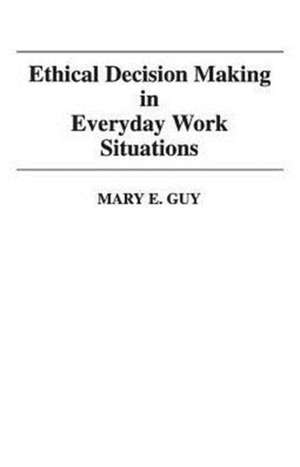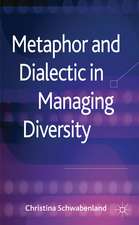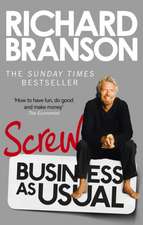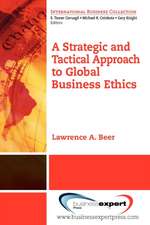Ethical Decision Making in Everyday Work Situations
Autor Mary E. Guyen Limba Engleză Paperback – 22 mar 1990 – vârsta până la 17 ani
| Toate formatele și edițiile | Preț | Express |
|---|---|---|
| Paperback (1) | 179.08 lei 6-8 săpt. | |
| Bloomsbury Publishing – 22 mar 1990 | 179.08 lei 6-8 săpt. | |
| Hardback (1) | 495.20 lei 6-8 săpt. | |
| Bloomsbury Publishing – 22 mar 1990 | 495.20 lei 6-8 săpt. |
Preț: 179.08 lei
Preț vechi: 222.33 lei
-19% Nou
Puncte Express: 269
Preț estimativ în valută:
34.27€ • 35.78$ • 28.36£
34.27€ • 35.78$ • 28.36£
Carte tipărită la comandă
Livrare economică 04-18 aprilie
Preluare comenzi: 021 569.72.76
Specificații
ISBN-13: 9780313360527
ISBN-10: 0313360529
Pagini: 206
Dimensiuni: 140 x 210 x 12 mm
Greutate: 0.36 kg
Editura: Bloomsbury Publishing
Colecția Praeger
Locul publicării:New York, United States
ISBN-10: 0313360529
Pagini: 206
Dimensiuni: 140 x 210 x 12 mm
Greutate: 0.36 kg
Editura: Bloomsbury Publishing
Colecția Praeger
Locul publicării:New York, United States
Notă biografică
MARY E. GUY is Collins Professor of Public Administration at the Askew School of Public Administration & Policy, Florida State University. Her previous books include From Organizational Decline to Organizational Renewal (Quorum, 1989) and Professionals in Organizations (Praeger, 1985).
Cuprins
PrefaceIntroduction to Ethics and Decision MakingValues, Ethics, and Personal ResponsibilityDecision MakingApplying Ethical Decision MakingInterpersonal RelationshipsConflicts of InterestAdapting to Company NormsGood CitizenshipGuidelines for Ethical Decision MakingBibliographyIndex
Recenzii
Guy. presents here a modern framework for incorporating ethics into business decisions. She identifies ten core values, such as caring, honesty, pursuit of excellence, loyalty, and responsible citizenship; her choices are valid for our society. In reaching a decision, one adds the impact of an action on each of these values to the usual analysis. When values conflict, choices must be made and the trade-offs explicitly noted. To illustrate the use of the framework, many cases with ethical components are presented. The case discussions show that Guy's technique is flexible and can lead to reasonable, satisfying decisions. The author provides thoughtful material for a practical discussion of core values and their application to business decision making. Such a discussion might raise the ethical awareness of people in many settings, but there is no evidence presented that following Guy's suggestions will lead to more ethical business behavior, although such a result is implied. Broad bibliography. University and large public library collections.












